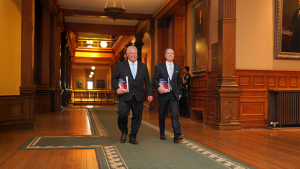It is customary in Canadian public procurement to allow some degree of competition for government supply contracts. In the case of large dollar contracts, the use of a tender procedure is intended to maximize competition. When talking about sole sourcing and single sourcing in government procurement specific rules apply.
Procurement Perspectives | Stephen Bauld
When talking about sole sourcing and single sourcing in government procurement specific rules apply.
Under the principle of open access, it is customary in Canadian public procurement to allow some degree of competition for government supply contracts. In the case of large dollar contracts, the use of a tender procedure is intended to maximize competition.
The cost and delay associated with the tender process render it impractical for mid-sized and low dollar contracts, but nevertheless there remains support for the notion open competition should be allowed to as great an extent as possible. For instance, for small contracts, there will often be a requirement to seek at least informal quotes from a number of different suppliers. In certain circumstances, however, it may be impractical or undesirable to hold any kind of open competition. If, for instance, a municipality wishes to buy widgets, and one supplier holds a patent on the manufacture of the product, then there is no point in seeking alternative bids: the patent grants a monopoly. Where such a situation exists, a sole source (or direct) contract must be let.
Most municipalities have identified the particular risks that are associated with this type of contracting. However, the sophistication of the responses varies widely. Some limit the controls imposed to a reporting requirement to council. Since this measure effectively applies only on an after-the-fact-basis, its effectiveness may be reasonably questioned.
Further controls are imposed in the case of higher value contracts. While there is much merit in the foregoing approach, it fails to recognize that sole and single source contracting requires an effective negotiation technique.
In a previous article I mentioned that negotiation in government is rarely used. Some effort should be made to drive down the price, or an attempt to confirm that a more favorable price is not advisable. Given the prevailing concern for transparency in public contracts, such a method is suitable for a municipality in only a relatively narrow band of cases. For instance, a municipality may decide to negotiate in the following situations:
• Where the procurement is related to professional services or scientific research and suppliers have unique fields of expertise
• Where a change of supplier could entail the purchase of material of different technical or performance characteristics that might result in a lack of compatibility with existing equipment, a costly requirement for retaining and a delay in introduction until such training was complete, or in analogous technical difficulties in operational or maintenance
• An open risk process might itself create a risk of damage on a large scale, or when people’s health and safety are at risk
• When a previous contract was awarded by open or restricted procedure and the municipality stated, at the time, the possibility of additional procurement in its invitation to tender
• When awarding the contract to another supplier would result in infringement of copyright or other intellectual property rights.
Most public authorities in Canada allow sole source direct contracting in only a very limited range of cases such as:
• The supply involves emergency purchasing of a critical nature
• Disclosure of information in an open contract competition would breach some duty of confidentiality, or compromise security or police investigation
• The supply relates to the purchase of necessary unique replacement parts from an exclusive source of supply.
Needless to say the rules are very strict in this procurement process.
Stephen Bauld, Canada's leading expert on government procurement, is a member of the Daily Commercial News editorial advisory board. He can be reached at stephenbauld@bell.blackberry.net.











Recent Comments
comments for this post are closed